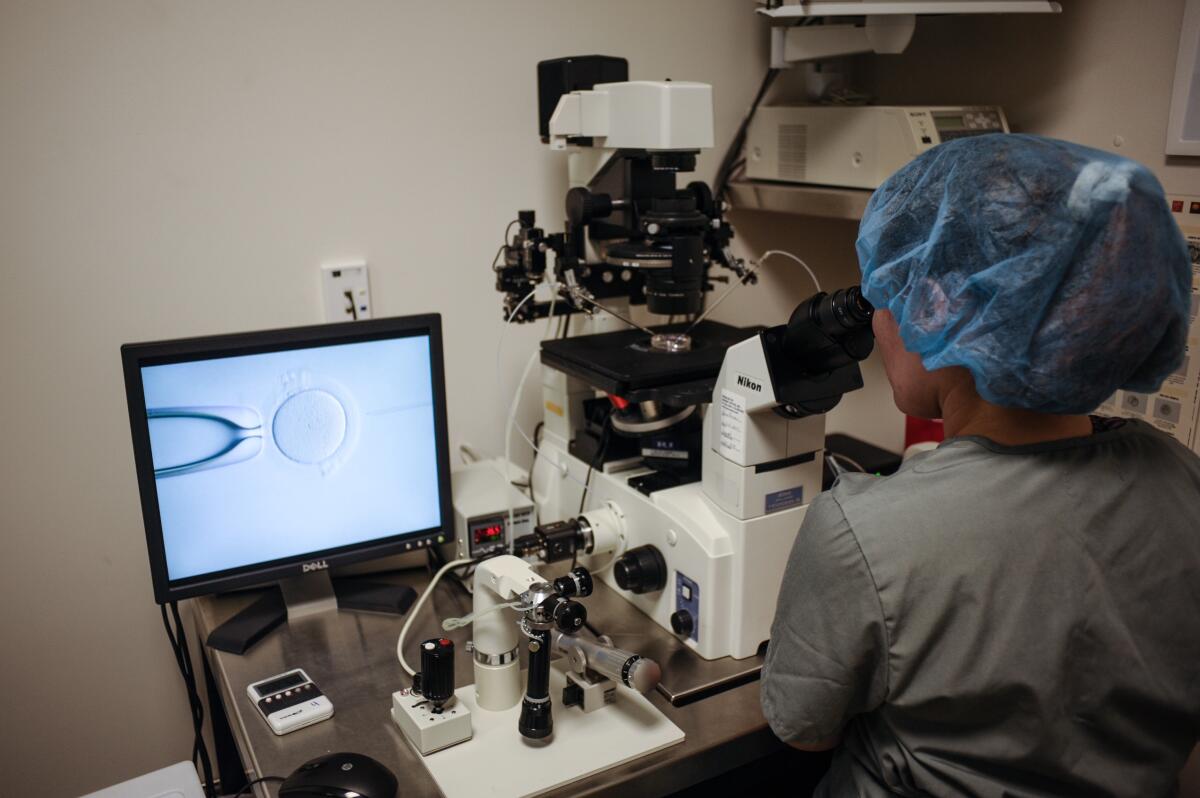Op-Ed: How IVF could be derailed by abortion restrictions

- Share via
A few days after the Supreme Court overturned Roe vs. Wade, Boston IVF, a fertility company with centers in six states, posted a statement that speaks to the havoc this decision will wreak not just for abortions, but for other forms of reproductive care.
The statement says: “Firstly and thankfully, our New England and New York IVF centers are NOT located in ‘trigger’ states.” It also recognizes that “the definition of ‘personhood’ and the rights of embryos may be affected” in states with trigger laws to outlaw abortion once Roe fell. Kindbody, another multistate fertility company, has begun moving cryopreserved in vitro embryos out of abortion-hostile states such as Missouri. Shady Grove Fertility, located in eight states and Washington, D.C., is developing “workarounds” to address legal risks that abortion bans pose, the Wall Street Journal reported.
In vitro fertilization and other fertility services seem separate from, even opposite to, abortion. People use IVF in hopes of having a child, not terminating a pregnancy. The new post-Roe laws do not explicitly mention lab-created embryos. Yet many abortion bans define “unborn child” or “person” with reference to fertilization. For example, a now-dead bill introduced in the Louisiana Legislature this year sought to “ensure the right to life and equal protection of the laws to all unborn children from the moment of fertilization by protecting them by the same laws protecting other human beings.” The bill spoke of “prenatal homicide,” assault and battery.
The U.S. has a high rate of maternal mortality. Research shows that legal abortion improves maternal health for disadvantaged groups.
Fertility patients and doctors are understandably nervous. Prior political activity validates those fears: Republican legislators in multiple states have put forth bills to grant legal “personhood” to frozen embryos. Earlier efforts to confer “personhood” on fertilized eggs used state ballot initiatives.
Several IVF practices put embryos at risk, making the practice vulnerable to legal challenges in abortion-hostile states that view life as beginning at fertilization. The practice most obviously comparable to abortion, and so potentially a target for IVF restrictions, is selective reduction. IVF can result in a multiple pregnancy, which increases risk to the pregnant person and to the fetuses. Selective reduction is used to eliminate some embryos to continue the pregnancy with fewer fetuses.
In addition, before a doctor transfers in vitro embryos to the patient’s uterus in hopes of implantation, embryologists screen and select embryos for transfer. Some patients use preimplantation testing to choose embryos in terms of genetic risk factors. Screening, testing and selection typically result in discarding embryos. The processes of freezing embryos from an IVF cycle for potential later use, and thawing them, also carry small risks to the embryos. Requiring patients to have clinics create and implant just one embryo at a time, to avoid destroying other embryos, significantly reduces the procedure’s likelihood of success and could require more of the expensive, physically demanding cycles.
Some might argue that using IVF at all places embryos in danger. Overall, the failure rate of IVF is higher than miscarriage rates in non-assisted pregnancy. The procedure’s failure rates are higher still for Black women, who are more likely to experience infertility to begin with. Somewhat ironically, most of the practices likely to be controversial aim to reduce the failure rate. And some research uses in vitro embryos to identify ways to increase pregnancy rates and reduce patient risk.
Arguably, all these practices result in prenatal homicide of “unborn children.” Thus states seeking to legislate protections for the “unborn” may very well criminalize the use of IVF to become pregnant.
IVF costs are a major barrier for the procedure.
In many ways, impacts on patients deprived of fertility care in their home state would mirror those of abortion patients. People with means or assistance will seek access by traveling to states that protect reproductive rights and care (though they may have to cover their tracks, as some lawmakers are attempting to criminalize interstate travel for such care). People who are low-income, members of marginalized communities or who face other healthcare barriers will lose access.
For now, people who seek abortion remain the primary target. But patients are already contacting IVF clinics with concerns about their frozen embryos and potential care. Fertility providers are decrying the rollback of Roe and encouraging patients to lobby state legislators for IVF exceptions to abortion bans.
That’s not a hopeless cause. Alabama’s antiabortion law, which was previously blocked but resumed after Roe’s fall, was written to exempt IVF by only targeting fertilized eggs in the womb.
In addition, IVF services are a multibillion-dollar industry. Kindbody reached unicorn status (meaning the startup was valued at more than $1 billion) this year. Revenue and jobs carry political weight, further setting the stage for laws that protect fertility technology even in abortion-hostile states.
But what we’d have then is law that declares the sanctity of unborn life at the expense of the pregnant person’s bodily autonomy — with limited exceptions for procedures in which there is not yet a pregnancy, and so the law imposes no restriction on bodily autonomy. This absurdity makes clear that abortion bans are less about protecting the sanctity of human life than they are about controlling it.
Lisa C. Ikemoto is a professor at UC Davis School of Law.
More to Read
A cure for the common opinion
Get thought-provoking perspectives with our weekly newsletter.
You may occasionally receive promotional content from the Los Angeles Times.












